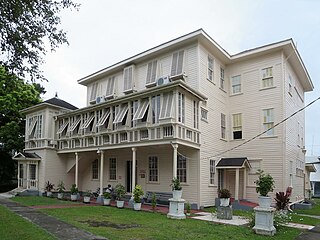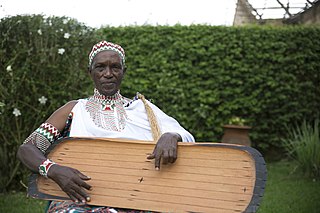
Cultural anthropology is a branch of anthropology focused on the study of cultural variation among humans. It is in contrast to social anthropology, which perceives cultural variation as a subset of a posited anthropological constant. The term sociocultural anthropology includes both cultural and social anthropology traditions.
In jazz and blues, a blue note is a note that—for expressive purposes—is sung or played at a slightly different pitch from standard. Typically the alteration is between a quartertone and a semitone, but this varies depending on the musical context.
Given the vastness of the African continent, its music is diverse, with regions and nations having many distinct musical traditions. African music includes the genres makwaya, highlife, mbube, township music, jùjú, fuji, jaiva, afrobeat, afrofusion, mbalax, Congolese rumba, soukous, ndombolo, makossa, kizomba, taarab and others. African music also uses a large variety of instruments from all across the continent. The music and dance of the African diaspora, formed to varying degrees on African musical traditions, include American music like Dixieland jazz, blues, jazz, and many Caribbean genres, such as calypso and soca. Latin American music genres such as cumbia, salsa music, son cubano, rumba, conga, bomba, samba and zouk were founded on the music of enslaved Africans, and have in turn influenced African popular music.
Linguistic anthropology is the interdisciplinary study of how language influences social life. It is a branch of anthropology that originated from the endeavor to document endangered languages and has grown over the past century to encompass most aspects of language structure and use.
Anthropological linguistics is the subfield of linguistics and anthropology which deals with the place of language in its wider social and cultural context, and its role in making and maintaining cultural practices and societal structures. While many linguists believe that a true field of anthropological linguistics is nonexistent, preferring the term linguistic anthropology to cover this subfield, many others regard the two as interchangeable.

Kurdish music refers to music performed in the Kurdish languages and Zaza-Gorani languages. The earliest study of Kurdish music was initiated by the renowned Armenian priest and composer Komitas in 1903, when he published his work "Chansons kurdes transcrites par le pere Komitas" which consisted of twelve Kurdish melodies which he had collected. The Armenian Karapetê Xaço also preserved many traditional Kurdish melodies throughout the 20th century by recording and performing them. In 1909, Scholar Isya Joseph published the work "Yezidi works" in which he documented the musical practice of the Yazidis including the role of the musician-like qewal figures and the instruments used by the minority.

A griot is a West African historian, storyteller, praise singer, poet, and/or musician.
Oral literature, orature, or folk literature is a genre of literature that is spoken or sung in contrast to that which is written, though much oral literature has been transcribed. There is no standard definition, as anthropologists have used varying descriptions for oral literature or folk literature. A broad conceptualization refers to it as literature characterized by oral transmission and the absence of any fixed form. It includes the stories, legends, and history passed through generations in a spoken form.

The music of Zambia has a rich heritage which falls roughly into categories of traditional, popular and Christian music.

Visual anthropology is a subfield of social anthropology that is concerned, in part, with the study and production of ethnographic photography, film and, since the mid-1990s, new media. More recently it has been used by historians of science and visual culture. Although sometimes wrongly conflated with ethnographic film, visual anthropology encompasses much more, including the anthropological study of all visual representations such as dance and other kinds of performance, museums and archiving, all visual arts, and the production and reception of mass media. Histories and analyses of representations from many cultures are part of visual anthropology: research topics include sandpaintings, tattoos, sculptures and reliefs, cave paintings, scrimshaw, jewelry, hieroglyphics, paintings and photographs. Also within the province of the subfield are studies of human vision, properties of media, the relationship of visual form and function, and applied, collaborative uses of visual representations.

Following Tanganyika's independence (1961) and unification with Zanzibar (1964), leading to the formation of the state of Tanzania, President Julius Nyerere emphasised a need to construct a national identity for the citizens of the new country. To achieve this, Nyerere provided what has been regarded by some commentators as one of the most successful cases of ethnic repression and identity transformation in Africa.

The Walter Roth Museum of Anthropology is a museum of anthropology in Georgetown, Guyana and claims to be the oldest such museum in the English-speaking Caribbean region. It was established in 1974, but not opened to the public until 1982. It is located at 61 Main Street, North Cummingsburg, Georgetown.

Staatliche Kunstsammlungen Dresden is a cultural institution in Dresden, Germany, owned by the State of Saxony. It is one of the most renowned and oldest museum institutions in the world, originating from the collections of the Saxon electors in the 16th century.
Gerhard Kubik is an Austrian music ethnologist from Vienna. He studied ethnology, musicology and African languages at the University of Vienna. He published his doctoral dissertation in 1971 and achieved habilitation in 1980.
The Aga Khan Music Initiative in Central Asia was established in 2000 by His Highness the Aga Khan with the aim of assisting in the preservation of Central Asia's musical heritage by ensuring its transmission to a new generation of artists and audiences, both inside the region and beyond its borders. It is an initiative of the Aga Khan Trust for Culture, an agency of the Aga Khan Development Network.
British Library Sounds is a British Library service providing free online access to a diverse range of spoken word, music and environmental sounds from the British Library Sound Archive. Anyone with web access can use the service to search, browse and listen to 50,000 digitised recordings. Playback and download of an additional 22,000 recordings is available to Athens or Shibboleth users in UK higher and further education. The service was originally launched with funding by the Jisc.
Helena Wulff is professor of social anthropology at Stockholm University. Her research is in the anthropology of communication and aesthetics based on a wide range of studies of the social worlds of literary production, dance, and the visual arts.

The Museum of Ethnography is a national museum in Budapest, Hungary.
Donald Kachamba (1953–2001) was a Malawian musician, composer and bandleader.

Trough zithers are a group of African stringed instruments or chordophones whose members resemble wooden bowls, pans, platters, or shallow gutters with strings stretched across the opening. A type of zither, the instruments may be quiet, depending upon the shape of the bowl or string-holder. Sound is often amplified with the addition of a gourd resonator. Instruments have been classed into five different types, based on shape.









